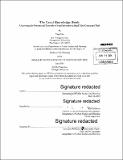| dc.contributor.advisor | Karl Seidman. | en_US |
| dc.contributor.author | Gao, Ying (Urban city planner) Massachusetts Institute of Technology | en_US |
| dc.contributor.other | Massachusetts Institute of Technology. Department of Urban Studies and Planning. | en_US |
| dc.date.accessioned | 2014-09-19T21:39:32Z | |
| dc.date.available | 2014-09-19T21:39:32Z | |
| dc.date.copyright | 2014 | en_US |
| dc.date.issued | 2014 | en_US |
| dc.identifier.uri | http://hdl.handle.net/1721.1/90097 | |
| dc.description | Thesis: M.C.P., Massachusetts Institute of Technology, Department of Urban Studies and Planning, 2014. | en_US |
| dc.description | Cataloged from PDF version of thesis. | en_US |
| dc.description | Includes bibliographical references (pages 142-148). | en_US |
| dc.description.abstract | In this thesis, I apply a case study method to examine the processes of knowledge management both within the neighborhood, and in institutional partnerships, by Banco Palmas, Brazil's first community development bank, as a way of uncovering a key component to understanding community-driven social innovations. Founded in 1998, in an urban peripheral neighborhood in Fortaleza, Brazil, the bank is best known for an unusual combination of microfinance integrated with local social currency. An increasing emphasis on community-driven approaches has become part of the practice of development in sectors ranging from economic development, disaster relief, to refugee assistance, yet what to make of the self-organized practices originating from the poor, as a concept, model or theory, is far from clear. First, I outline a "follow the knowledge" research design combining a working conceptual framework of knowledge, multi-source data collection, including semistructured interviews and extensive participant observation, and other fieldwork activities. The resulting 22 formal interviews from 13 institutions and additional case study data were interpreted with mutual corroboration and thick contextualization relying on relevant literature. The findings from within the neighborhood showed that the most effective function related to knowledge had to do with maintaining a community of practice of local social entrepreneurs, which the bank expertly did by combining what I identify as three practices and two processes of local knowledge management. Moreover, the bank's local knowledge directly built on the community's long history of mobilization, and the accumulation of experience-based knowledge was such that the organization could be seen as serving in the role of local knowledge bank for the neighborhood. In institutional partnerships, Banco Palmas provided local knowledge to key partners and allies in academic, civil society and government branches, while responding to a number of institutional constraints in contemporary Brazil, charting a unique path from the grassroots to influencing national policies. In conclusion, I draw lessons on replicating local knowledge bank, suggest strategic and tactical recommendations for Banco Palmas, and reflect on my personal learning experience. | en_US |
| dc.description.statementofresponsibility | by Ying Gao. | en_US |
| dc.format.extent | 148 pages | en_US |
| dc.language.iso | eng | en_US |
| dc.publisher | Massachusetts Institute of Technology | en_US |
| dc.rights | M.I.T. theses are protected by copyright. They may be viewed from this source for any purpose, but reproduction or distribution in any format is prohibited without written permission. See provided URL for inquiries about permission. | en_US |
| dc.rights.uri | http://dspace.mit.edu/handle/1721.1/7582 | en_US |
| dc.subject | Urban Studies and Planning. | en_US |
| dc.title | The local knowledge bank : uncovering the processes and networks of social innovation at Brazil's first community bank | en_US |
| dc.type | Thesis | en_US |
| dc.description.degree | M.C.P. | en_US |
| dc.contributor.department | Massachusetts Institute of Technology. Department of Urban Studies and Planning | |
| dc.identifier.oclc | 890144037 | en_US |
